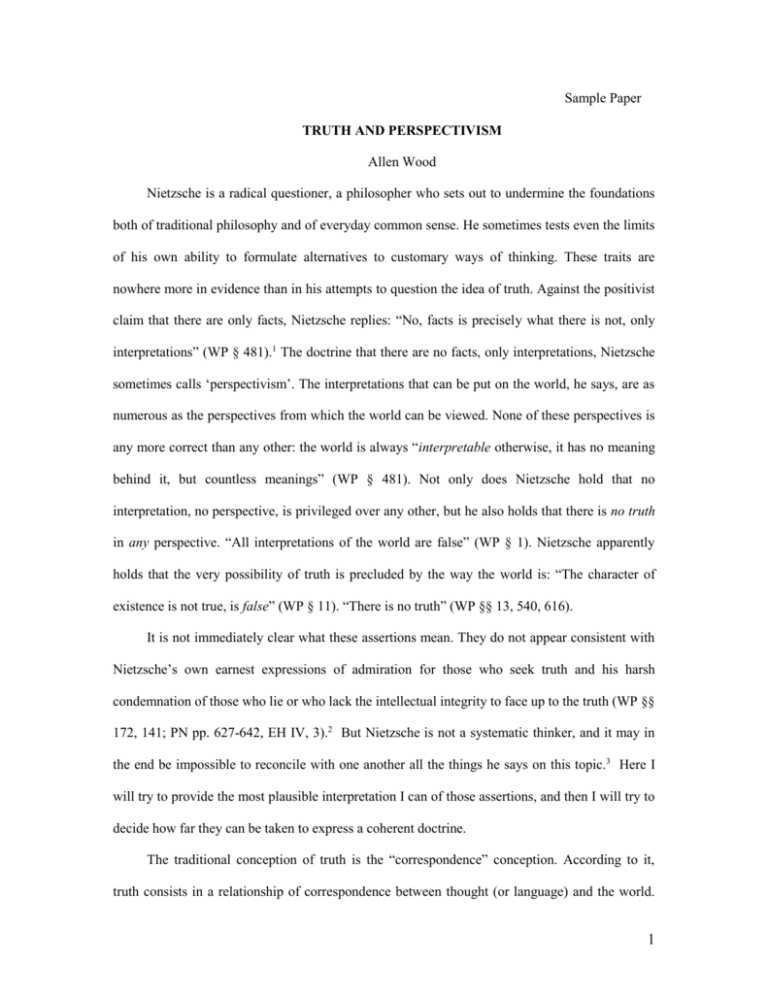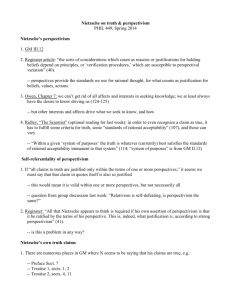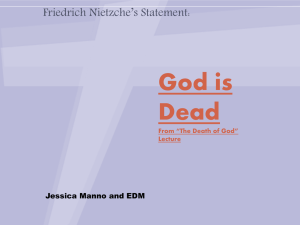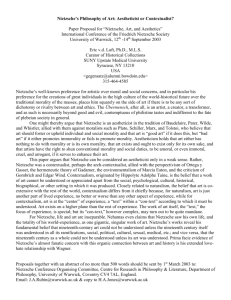Sample Paper: T - Stanford University
advertisement

Sample Paper TRUTH AND PERSPECTIVISM Allen Wood Nietzsche is a radical questioner, a philosopher who sets out to undermine the foundations both of traditional philosophy and of everyday common sense. He sometimes tests even the limits of his own ability to formulate alternatives to customary ways of thinking. These traits are nowhere more in evidence than in his attempts to question the idea of truth. Against the positivist claim that there are only facts, Nietzsche replies: “No, facts is precisely what there is not, only interpretations” (WP § 481).1 The doctrine that there are no facts, only interpretations, Nietzsche sometimes calls ‘perspectivism’. The interpretations that can be put on the world, he says, are as numerous as the perspectives from which the world can be viewed. None of these perspectives is any more correct than any other: the world is always “interpretable otherwise, it has no meaning behind it, but countless meanings” (WP § 481). Not only does Nietzsche hold that no interpretation, no perspective, is privileged over any other, but he also holds that there is no truth in any perspective. “All interpretations of the world are false” (WP § 1). Nietzsche apparently holds that the very possibility of truth is precluded by the way the world is: “The character of existence is not true, is false” (WP § 11). “There is no truth” (WP §§ 13, 540, 616). It is not immediately clear what these assertions mean. They do not appear consistent with Nietzsche’s own earnest expressions of admiration for those who seek truth and his harsh condemnation of those who lie or who lack the intellectual integrity to face up to the truth (WP §§ 172, 141; PN pp. 627-642, EH IV, 3).2 But Nietzsche is not a systematic thinker, and it may in the end be impossible to reconcile with one another all the things he says on this topic.3 Here I will try to provide the most plausible interpretation I can of those assertions, and then I will try to decide how far they can be taken to express a coherent doctrine. The traditional conception of truth is the “correspondence” conception. According to it, truth consists in a relationship of correspondence between thought (or language) and the world. 1 Suppose I think (or say) “That leaf is green” (cf. PN p.46). This thought or utterance expresses the proposition that a certain subject (the leaf to which I am referring) has a certain property (greenness). This proposition, hence my thought or utterance of it, is true if the world referred to by my thinking corresponds to what I have thought or said. In this case, what I have thought or said is true if the leaf to which I am referring happens to be green. Some writers on Nietzsche’s philosophy claim that Nietzsche’s perspectivism involves a denial of the correspondence conception of truth.4 But Nietzsche’s statements about truth (especially his denial that that there is any truth) make more sense if we suppose him to be accepting the correspondence conception, but claiming that the required correspondence between thought (or language) and the world are not to be found because of the way the world itself is. Thought and language, Nietzsche holds, have certain metaphysical presuppositions, which involve metaphysical requirements that must be met by the world if it is to correspond to them in the right way. But Nietzsche thinks that the world is such that these requirements cannot be met. Nietzsche expresses this thought when he says: “The character of existence is false” (WP § 11), and also when he subscribes to the “hypothesis” that “there is no truth, there is no absolute nature of things” (WP § 13). Nietzsche is sometimes fairly specific about what the world must be like for thoughts or statements to be true, and about why he holds that the world is not like that. A proposition, (whether thought or expressed in language) has traditionally been conceived as having the form ‘S is P’: It consists in a subject term, a predicate term and a “copula” (usually some part of the verb ‘to be’) connecting the two terms. For any proposition to be true, the following three conditions must hold: (1) There have to be things that can be referred to by subject terms, (2) There have to be properties to be designated by predicate terms and (3) The relationship of “being” has to obtain between these things and their properties. According to Nietzsche, however, the world is such that none of these three conditions is satisfied. 2 First, Nietzsche denies that there are any things. He holds instead that there are only ever shifting “dynamic quanta” of will to power, which consist only in their unstable relation to all other such quanta. There is no agent behind the action of these quanta on one another, and the very being of the quanta is their acting. All “unity” or “thinghood” in the world is a fiction introduced by interpretation (WP §§ 634-635; PN pp. 482-483, GM I 13). So the proposition “This leaf is green” cannot be true because there are no leaves, in fact no things at all, for this or any other proposition to be about. Second, there are no properties, such as “greenness” or “leafhood” for predicates to designate. There is nothing that all “leaves” or all “green” things have in common – each is utterly different and unique. Concepts such as “green” and “leaf” arise through a simplifying interpretation (or falsification), which equates things that are unequal: “Every concept originates through our equating what is unequal. No leaf ever wholly equals another, and the concept ‘leaf’ is formed through an arbitrary abstraction from these individual differences, through forgetting distinctions” (PN p. 46; see WP § 557). Finally, there is no such thing as ‘being’ – no reality, stability or permanence such as is asserted (Nietzsche thinks) when (applying the ‘copula’) one asserts that a leaf is green, or indeed that any thing is in any wise at all. Nietzsche holds that the whole idea of ‘being’ is a sick invention of metaphysicians, who take vengeance on life (which is characterized by the ineluctable change, impermanence and elusiveness of the world of sense) by declaring all these to be mere “appearance”. “Being” is bound up with the Platonic vision of a “true world”, a timeless heaven of changeless forms (PN pp. 485-486). Even our sensations, Nietzsche thinks, are laden with falsifying interpretation, which introduces a simplifying order into things -- and this is what turns it into a world of “appearance” (WP § 602). But the opposite of this “appearance” is not the timeless intelligible “true” world of the philosophers, but instead “the formless unformulable world of the chaos of sensations” (WP § 569). This is why “there are no facts, everything is in flux, incomprehensible, elusive” (WP § 604). 3 If Nietzsche is right about the kind of world we live in, then he is justified in claiming that most thoughts or statements we take to be true (e.g. “That leaf is green) cannot correspond to the world. But in one way, Nietzsche seems to be taking too narrow a view of what thought and language presuppose. For Nietzsche himself characterizes the world, and thought and language, when he declares that it is “in flux, incomprehensible, elusive” and describes the metaphysical presuppositions of thought and language. Language and thought, it seems, might still correspond to the world on Nietzsche’s account as long as they characterized the world by denying thinghood, permanence, equality or permanence to anything in it. But Nietzsche has an even more radical step to take, which deprives thought and language even of the capacity to represent the world truly in purely negative terms. That step consists in his “perspectivism” proper, his claim that all thinking (and speaking) is interpretation from a certain perspective. Even when we characterize the world negatively (denying permanence or thinghood to it), we still make, in an important sense, the metaphysical presupposition involved in the copula – namely, the presupposition that what we say is, the presupposition that the world we talk about has a constitution in itself apart from any interpretation of it. The very notion of a true assertion presupposes a single, impartial impersonal truth that can be distinguished in principle from any perspectival interpretation of it. The very act of asserting presupposes the claim that what is asserted is so, is the case, absolutely or in itself apart from any interpretation placed on the world by the asserter. But this presupposition, Nietzsche says, runs counter to the picture of the world as made up of dynamic quanta of will to power, struggling with one another for domination, including the struggle for a dominant interpretation of themselves and one another and of their struggling. “That things possess a constitution in themselves quite apart from interpretation and subjectivity, is a quite idle hypothesis” (WP § 560). “Every center of force adopts a perspective toward the entire remainder, i.e. its own particular valuation, mode of action, and mode of resistance” (WP § 567). “There are no ‘facts-in-themselves,’ for a sense must always be projected onto them before there can be ‘facts’” (WP § 556). “There are many kinds of 4 eyes…and consequently there are many kinds of ‘truths’, and consequently there is no truth” (WP § 540). The idea that Nietzsche rejects the correspondence theory of truth occurs to some writers because Nietzsche seems to them in places to be offering alternative theories of truth, theories that connect truth to pragmatic usefulness, or interpretive convenience, or power and successful domination. In some places, he seems to be saying that to call an assertion ‘true’ is just to say that it is useful or convenient or expressive of power, on the part of the one who makes it. “What is truth? Perhaps a kind of belief which has become a condition of life?” (WP § 532). “What is truth?—Inertia, that hypothesis which gives rise to contentment” (WP § 537). “The criterion of truth resides in the enhancement of the feeling of power” (WP § 534). These statements, however, need not be read as alternatives to the correspondence theory of truth. Instead, they are attempts to account for the fact that even though there is no truth (truth as correspondence), in ordinary thought and speech terms like ‘true’ and ‘truth’ are consistently affirmed of some propositions and denied of others. Nietzsche’s explanation for this consistency is that the illusion of correspondence operates on the asserters in a systematic way: we claim correspondence to reality for those thoughts or statements that are indispensable to life (for our life), or which are convenient (for us) or which express our conditions of dominance or our feelings of power. This claim on our part is a systematic illusion built into our perspective (indeed, into every perspective), which involves having an interest in foisting on the world itself our interpretation of that world (this “foisting” is just one aspect of our will to power). It is natural and helpful to us (as centers of will to power) to forget our own contribution to constituting the world as it appears to us, since to be aware of that contribution might make us open to other perspectives, which would be detrimental to our attempt to master the world by imposing our interpretation on it exclusively. Thus Nietzsche says: “Truths are illusions about which one has forgotten that this is what they are” (WP § 493, PN p. 47; cf. PN p. 497). 5 Nietzsche’s perspectivism is an attractive doctrine in certain ways, but also a mindboggling doctrine (perhaps this is even one of its attractions). We might question it by asking how Nietzsche thinks he can know that the world consists of quanta of will to power struggling and interpreting, that there are no things, no properties, no permanence, no absolute reality apart from some interested and perspectival interpretation. After all, knowledge, requires the truth of what is known, and if there is no truth, then Nietzsche can claim no knowledge of his theory of the will to power. But the question how Nietzsche knows anything he says pales before an even more fundamental problem that faces Nietzsche’s perspectivism as soon as he ventures to assert it at all (whether or not he represents it as ‘known’). For as soon as Nietzsche asserts ‘There is no truth’, he has already presupposed that there is a truth, a way things are absolutely and in themselves, to which his own statement is being asserted to correspond. For this is just what one does whenever one makes any assertion. Nietzsche’s perspectivism, therefore, refutes itself. Perspectivism cannot even be coherently asserted (or, consequently, believed, much less known). For someone who believes perspectivism thereby believes that perspectivism is true -- as Nietzsche himself realizes: “Every belief is a holding for true” (WP § 15). Perspectivism itself must therefore, to be consistent with itself, be condemned as a case of the very “illusion” of which perspectivism represents itself as the denial. Perspectivism might be rendered coherent if it were understood as exempting itself from its own claims about the perspectivity, falsity and illusion of all assertions and beliefs. Some writers on Nietzsche attempt to save the coherence of the doctrine by interpreting it to be limited in scope, so that some of Nietzsche’s own teachings, including perspectivism, are not meant to fall under it. 5 The problem with this approach is that Nietzsche never suggests that pespectivism is limited in scope, and his own doctrines provide us with no reason to exempt perspectivism – which is the same as exempting Nietzsche himself – from its own strictures. Are there any beliefs, on Nietzsche’s view, that are not expressions of a believer’s interpretation of the world, or that are exceptions to the thesis that all beliefs serve as perspectival expressions of the believer’s will 6 to power? Does Nietzsche ever claim to have found a standpoint outside the will to power that might provide his perspectivism with immunity to the subjectivity and illusion he finds in all other views, beliefs and interpretations of the world? I find nothing in either the letter or the spirit of Nietzsche’s texts that gives us any reason to think so.6 Therefore, whatever other beliefs of ours may or may not be perspectival illusions, perspectivism has to be Nietzsche’s illusion. 7 Notes 1 Friedrich Nietzsche, The Will to Power, translated by Walter Kaufmann and R. J. Hollingdale (New York: Random House, 1967). This book will be abbreviated ‘WP’ and cited by section (§) number. ‘PN’ abbreviates, Walter Kaufmann, editor, The Portable Nietzsche (New York: Viking Press, 1954), which is cited by page number. ‘EH’ abbreviates Ecce Homo, and ‘GM’ abbreviates On the Genealogy of Morals, both of which will be cited by chapter and section number from Walter Kaufmann, translator, On the Genealogy of Morals and Ecce Homo (New York: Vintage, 1968). 2 Many of Nietzsche’s difficult statements also come from the Will to Power, a set of notes Nietzsche himself did not publish. Some scholars would disapprove of using these notes in interpreting Nietzsche, and some would also want to distinguish between Nietzsche’s statements in his published writings, depending on when they were written. The most careful example of this kind of scholarship is to be found in Maude Marie Clark, Nietzsche on Truth and Philosophy (New York: Cambridge University Press, 1990). 3 4 For example, Richard Schacht, Nietzsche (London: Routledge, 1983), p. 67. 5 See John T. Wilcox, Truth and Value in Nietzsche (Ann Arbor: University of Michigan Press, 1974), especially Chapter 6; and Schacht, Nietzsche, Chapter II, especially pp. 95-117. Nietzsche himself says: “Supposing that this [perspectivism] is only interpretation – and you will be eager enough to make this objection? – well, so much the better!” Nietzsche, Beyond Good and Evil, translated by Walter Kaufmann (New York: Vintage, 1966), § 22. This remark is no successful reply to the objection that perspectivism is incoherent or self-refuting. It does not even seem to involve a clear recognition of what the problem is, since no one who saw this clearly could lightheartedly respond “So much the better” to the objection that perspectivism refutes itself. But the remark is unambiguously a repudiation of the suggestion that perspectivism itself is intended to be exempt from its own claim that all views and assertions are merely interested interpretations. 6 8








